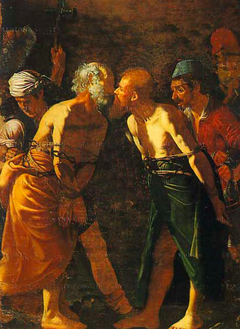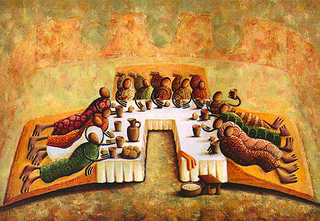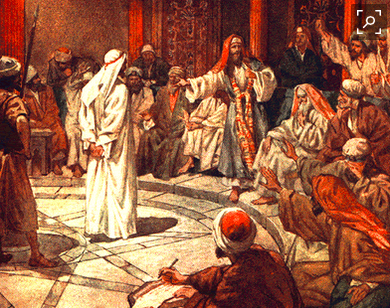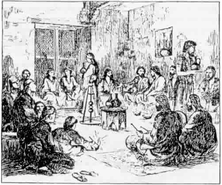 Leveling Habits: The Table, Household Baptism, and Kiss that Changed Everything (C) The Kiss. Whereas Tertullian might have invented the term “kiss of peace” (Or. 18), Paul and Peter indicate that the “kiss” existed among the NT gathered-church (Rom 16:16; 1 Cor 16:20; 2 Cor 13:12; 1 Thess 5:26; 1 Pet 5:14). Here and in early church writings, the abundance of “kiss” references seem to suggest it was not merely symbolism, but an actual, intimate kiss. As one put it, the “kiss” was “a body-centered ritual.”[1] What began as simple greeting became a command to greet each other and, thus, moved to habitus. Although the role of “the kiss” varied within society and at differing geographic locations, the “kiss” was a social-cultural habit in the Greco-Roman world that denoted respect and friendship. There is no surprise, then, that the kiss was an element of the apostolic gathered-church and in the developing early church Eucharistic liturgies. For the most part, the church has institutionalized itself right out of the kissing business. Today, the “kiss” is barely detected at a church gathering save for those that retain the concept as a “pass the peace,” more or less a greeting. However, the Greco-Roman social kiss was a form of respect used to greet another person of equal social status. The kiss was “a symbol of social stratification and status,” a cultural habitus of hierarchy,[2] an “action that joined together two individuals, kissing was a particularly apt symbol for such [cultural and social] border crossings.”[3] The kiss, however, took on a subversive nature within household gathered-churches as it was exchanged among unequals as they assembled at table. All believers—strangers at cross-cultural levels, men, women, children, slaves—at the gathered-church, greeted with a kiss, indicating that such a socially diverse and unequal cohort of people all-together belonged to God in Christ. Since, at the first, their gathered-church suppers were semi-public household events, they risked the slander of on-lookers.[4] People coming together, crossing gender, social status, religious (in as much as new converts and guests had came from diverse religious sects and temples), national, and ethnic divisions—and finding themselves one in Christ. Allen Kreider asks, “Is it possible that Paul and other Christian leaders urged their people to exchange the kiss greeting because it was a practice that could sustain a Christlike habitus across time?”[5] As Eucharistic liturgies developed, “the kiss” prepared the gathered-church for the “table” that followed communal prayers (per Justin and Cyprian). As early as the Didache and Hermas, the “kiss” was understood as reconciliation, a precondition for partaking in the Lords’ Supper (a trajectory application of 1 Cor 11) and, so, “the kiss” preceded the table.[6] That underscored the meaning of the Supper and table, namely their unity (again, the true offense at the table and a fair trajectory application of 1 Corinthians 11). Every act or ordinance created or adapted and used by the apostolic and early church had one thing in common: each accomplished and spoke to unity among earthy unequals. The table, household baptisms, and the kiss embodied a way of defining a new identity and maintaining the bond of a community as a people who didn’t (socially, culturally, legally) belong together.[7] As established habitus of the gathered-church, they were creating a wholly new understanding of humanity-together, a new social reality in Christ.[8] A household gathered-church (multiplied and embedded throughout the empire) was a new living social context of people, a reality of the death of Jesus, creating subversive social mapping that challenged and changed everything concerning the hierarchy of human relationships [1] William Klassen, “The Kiss as Sacred Act in the New Testament: An example of Social Boundary Lines.” New Testament Studies 39 (1993): 122–35; Michael Philip Penn, Kissing Christians: Ritual and Community in the Late Ancient Church (Philadelphia: University of Pennsylvania Press, 2005), 123. [2] Ferment, 215. [3] Penn, Kissing Christians, 90. [4] Klassen, “The Kiss as Sacred Act.” [5] Ferment, 215. [6] Ibid., 214. [7] “Radical Intimacy” (Ferment, 216, quoting L. Edwards Phillips, “The Ritual Kiss in Early Christian Worship” [PhD diss, University of Notre Dame, 1992], p. 270). [8] Penn, Kissing Christians, 90, 91-119; note Justin Martyr 1 Apol. 65.2, Chapter 65. Administration of the sacraments: “Having ended the prayers, we salute one another with a kiss. There is then brought to the president of the brethren bread and a cup of wine mixed with water . . .” And “Then the Deacon cries aloud, Receive ye one another; and let us kiss one another. Think not that this kiss is of the same character with those given in public by common friends. It is not such: but this kiss blends souls one with another, and courts entire forgiveness for them. The kiss therefore is the sign that our souls are mingled together, and banish all remembrance of wrongs. This is a thread consisting of parts of a a recent paper presented at the 2017 Evangelical Theological Society's annual meeting in Providence, RI. The goal is to develop an anthology of essays (by various authors) on the subject, Christian Responses to Tyranny. Part 1 | Part 2a | Part 2b | Part 2c | Part 3 | Part 3a | Part 3b | Part 4a | Part 4b | Part 5 For the entire thread (remember to scroll backwards for previous posts) << Gathered-church >>
0 Comments
 Leveling Habits: The Table, Household Baptism, and Kiss that Changed Everything (A) Doing “church” (and all its accompanying habitus) is a hermeneutic for reading the NT and for making church related application. Herein is our hermeneutical problem: NT documents tend to be read (heard) divorced from the most likely venue wherein they were originally read, heard, and repeated as instruction, that is, at a symposium after a gathered-church had reclined at a household deipnon (supper). NT documents should be read within such an authentic venue-hermeneutic, that is as a gathered-church set at a common meal (this is My body, which is for you; do this in remembrance of Me), the lifting of a cup to celebrate the Lord Jesus (this cup is the new covenant in My blood), and the ensuing symposium where instruction would have occurred. There is significant hermeneutical and interpretive value to the household-venue and, as such, is important for faithful and relevant trajectory application. A Meal and Table of Unequals. As most experience the Lord’s Supper, we find no NT equivalent nor within the first 150 years of church history. Despite the NT calling it a supper, most contemporary forms are foreign to the NT, that is, small crackers and a thimble-sized plastic cup (i.e., tokens of bread and wine), with congregants sitting in theater-like rows (i.e., pews or chairs), and all the action and authority “up-front.” The NT Lord’s Supper habitus centered on who reclined at table; whereas, most modern Lord’s Supper habitus is about the appropriate distribution of the tokens. Something happened at those NT/early church gatherings that was culturally subversive and sociologically seditious. The gathered-church formed its identity within the context of “household” amid habitus that was instructive to them and hermeneutical to us. In the Greco-Roman world, food occasions were a means for creating community and bonding that community together—meals were encoded, social habits were established, and status defined.[1] The habitus of each meal-gathering was a message “about different degrees of hierarchy, inclusion, exclusion, boundaries, and transactions across boundaries.”[2] Men were at the center of such meals and where one reclined at table indicated one’s ranking in society and among his associates. Invitation only. Women and slaves served and did not recline at table. Children were not permitted. However, it was acceptable at these meals for entertainment to include sexual encounters “between adult men and pubescent or adolescent boys.”[3] Depending on social class and wealth, there would have been plentiful entertainment, namely “flute girls, party games, gambling, dramas, mimes, strippers, jesters, moral poems, talks, debate, political, religious, moral, abusive, to erotic discussions”[4] and “sexual liaisons and promiscuities were very common.”[5] Classes did not ordinarily mix. The household banquet-meal was a built-in means for social formation, “a miniature reproduction of Roman society,” serving as a virtual classroom where one’s social status was taught, practiced, and formally enculturated. Social mapping was practiced, a habitus marking identity and social boundaries. The banquet-meal was the imperial instrument for maintaining “social control of the polis”[6] and was utilized “to dominate people and keep them in their place.”[7] This was interrupted by the household gathered-church where women, children, slaves, and men from differing classes and economic status were welcome to recline at table as equals—literally an open table of unequals. The gathered-church adapted, from its NT origin and as the early church took root in the ensuing century, the customary “pattern found throughout their world,”[8] the Greco-Roman household banquet-meal (deipnon) and symposium. Greco-Roman banquet-meal hosts and guests all acknowledged “the gift of food to the gods,” who were understood as the real hosts of the meal.[9] Such meal-gatherings always honored Caesar and some patron deity, which made such meals a blend of social and religious habitus. However, while Romans lifted a cup to Caesar and national deities, local gods, or a household emulate at the bridge between deipnon and symposium, Christians raised “the cup of blessing” in honor of Christ (1 Cor 10:16; cf. 11:23–28). This made each gathered-church at table seditious, for it was not only affirming a traitorous allegiance to another Lord and God, the occasion created a habitus that taught and maintained new identities, removed boundaries, and promoted counter- and cross-cultural relationships. However, the nature of the gospel and trajectory application of the cross brought about a challenging social-mapping: an ecclesial-demographical mapping of unequal people outside the banquet hall, yet who reclined as equals at table. Adapting the Greco-Roman evening deipnon/symposium set a household gathered-church on the eve (i.e., Saturday evening) of the Lord’s Day (i.e., Sunday), which accommodated the poor and slaves and working children that could not have attended an early morning “service,” for history had yet not giving us a 6-day work week with Sunday off.[10] The wealthy and upper-class church attenders had more power to adjust their daily schedule; the poor and destitute could not. Furthermore, this history and a household-venue hermeneutic allows a fair reading of the deipnon-table and Lord’s Supper issue in 1 Corinthians 10-11 to be about “haves” that were separating (or distinguishing) themselves through food habitus from the “have nots” at the Lord’s table. In this way, the gathered-church-temple (1 Cor 3:16–17; cf. Eph 2:18-22) was being destroyed (1 Cor 11:18–22). These meal-occasions failed, literally at table, to display love toward one another (the reason for chapter 13), thus they had ceased to eat the “Lord’s’ Supper,” abandoning the gospel-ecclesial social-mapping and habitus purpose of the meal.[11] [1] Lanuwabang Jamir, Exclusion and Judgement in Fellowship Meals: The Socio-historical Background of 1 Corinthians 11:17–34 (Eugene, OR: Pickwick Publications, 2016), 3; quoting Robertson Smith from his Religion of the Semites (page 217); —eating was understood as a sacred, mystical act when done together [2] Mary Douglas, “Deciphering a Meal,” in Implicit Meanings: Essays in Anthropology (London: Routledge, 1975), 249–75, 249. [3] Jamir, Exclusion and Judgement, 17; less so among Jewish households, but still drinking and other forms of merriment were very central to the latter, symposia, part of the banquet. [4] Ibid, 16. [5] Ibid, 17. [6] Street, Subversive Meals, 9. Italics original. [7] Ibid, 15. [8] Street, Subversive Meals, 11. [9] Jamir, Exclusion and Judgement, 15. [10] Ferment, 191; note: Justin, 1 Apol. 67.3; Origen, Hom. Luc. 38.6 [11] Street, Subversive Meals, 37; a similar venue-hermeneutic reading can be made of the James 2 “church” text. This is a thread consisting of parts of a a recent paper presented at the 2017 Evangelical Theological Society's annual meeting in Providence, RI. The goal is to develop an anthology of essays (by various authors) on the subject, Christian Responses to Tyranny. Part 1 | Part 2a | Part 2b | Part 2c | Part 3 | Part 3a | Part 3b | Part 4a | Part 4b | Part 5 For the entire thread (remember to scroll backwards for previous posts) << Gathered-church >>
 A Household Table-Waiter Preaches. Luke’s story of Stephen’s sermon before Jewish leaders (Acts 6:1–7:60) is framed by the gathered-church household-venue (5:42; 8:3; cf. 2:46). At some point the widows of Hellenist converts were being overlooked in the daily serving of food (Acts 6:1c) at the deipnon (i.e., supper) component of the gathered-church. The Acts 6 setting assumes a house-venue (from house to house, Acts 5:42) where the Greek-speaking widows were to have found a place at table (certainly a trajectory application of the distributed Spirit upon aged women!) As a response, the twelve (apostles) determined their role was prayer and the ministry of the word (Acts 6:2) and that reputable, Spirit-filled men were to be selected to serve (diakoneō) tables at the deipnon and care for the widows. Men! Not slaves. Not women. This was an astonishing trajectory application of the gospel and the inaugural distribution of the Spirit. Men did not do this in a Greco-Roman household. Furthermore, when Luke choose his very first scene afterward for the “ministry of the word,” he does not pick one that included an apostle; it was a table-waiting lay-person from among the household gathered-church, Stephen. Furthermore, we should not treat lightly the “house” theme in table-waiter Stephen’s defense before temple-leadership, for he draws upon a text that deconstructs temple-imagery and his trajectory application constructs God’s new dwelling of “house.” Stephen quotes Isaiah’s words to Jewish exiles to stress that the Most High does not dwell in anything made by human hands (cheiropoiētois): ‘Heaven is My throne, Given Luke’s “house” theme elsewhere,[1] it is not a stretch to answer the Isianic question--What kind of house will you build for Me?—by pointing to the newly distributed Spirit among the household gathered-churches. And, after Stephen is stoned (Acts 7:54–60), Luke’s narrative pans straightaway back to the house church venue as Saul makes his arrests from house to house (8:3). The first narrative contrast to the temple is the new resting place of God among believers, that is “house to house.” [1] Note the 14 house-banquets in the Gospel of Luke and the numerous occasions in Acts. This is a thread consisting of parts of a a recent paper presented at the 2017 Evangelical Theological Society's annual meeting in Providence, RI. The goal is to develop an anthology of essays (by various authors) on the subject, Christian Responses to Tyranny. Part 1 | Part 2a | Part 2b | Part 2c | Part 3 | Part 3a | Part 3b | Part 4a | Part 4b | Part 5 For the entire thread (remember to scroll backwards for previous posts) << Gathered-church >>
In Ibram X. Kendi’s stellar volume on the history of racist ideas in America, Stamped From the Beginning, he argues for Aristotle’s influence on colonial Puritan politicians and preachers. And without hesitation, Kendi moves quickly back to early Christianity, linking the apostle Paul to the Aristotelian thread of “superior” demographics, the “three-tiered of hierarchy slave relations—heavenly master (top), earthy master (middle), enslaved (bottom).” Kendi, then, quotes Paul from Colossians 3:22: Slaves, in all things obey those who are your masters on earth, not with external service, as those who merely please men, but with sincerity of heart, fearing the Lord. Is this, however, a fair characterization of Paul’s view on slavery? Still, why didn’t Paul just simply condemn slavery outright? Moreover, why didn’t Jesus and the NT writers directly address the cultural and social oppression of women, children, and slaves? Yet, perhaps they had. Imagine, still, just maybe they had something more noble in mind? Arguably, it was the presence of Christianity in the Roman Empire that turned socially accepted tiers of human hierarchies and practices up-side-down, albeit slowly penetrating the social fabric of the Greco-Roman world through the formation of a household platform (literally) that inaugurated a social mapping revolution. Some cast early Christianity as a protest movement against an oppressive, imperial empire, yet the apostolic and early church lacked any power or leverage for such social and cultural revolution. New Testament writers did not seek to overthrow authority structures wherein the gathered-church inhabited. Nonetheless, the household gathered-church, along with their table-fellowship (i.e., the common meal/the Lord’s Supper) and other early gathered-church practices (i.e., household baptism and kiss), was the platform for making known God’s cosmic reconciliation. In this paper, I suggest it was the narrative of the gospel as it intruded upon the Gentile world in the midst of the local, household gathered-church that changed everything--that more noble idea. It is my thesis that the gospel let loose (applied and socially forming) among household gathered-churches changed existing social mapping, worked out through the habitus taught and implied (i.e., trajectory application) by NT teaching. My concern is to hear how relevant narrative choices in Acts speak to the household gathered-church and how its habitus resulted in new social-mapping (forms and habits) consistent with the gospel and the meaning of the cross. This is a thread consisting of parts of a a recent paper presented at the 2017 Evangelical Theological Society's annual meeting in Providence, RI. The goal is to develop an anthology of essays (by various authors) on the subject, Christian Responses to Tyranny. Part 1 | Part 2a | Part 2b | Part 2c | Part 3 | Part 3a | Part 3b | Part 4a | Part 4b | Part 5 For the entire thread (remember to scroll backwards for previous posts) << Gathered-church >>
|
AuthorChip M. Anderson, advocate for biblical social action; pastor of an urban church plant in the Hill neighborhood of New Haven, CT; husband, father, author, former Greek & NT professor; and, 19 years involved with social action. Archives
February 2024
Categories
All
|
Pages |
More Pages |
|

 RSS Feed
RSS Feed